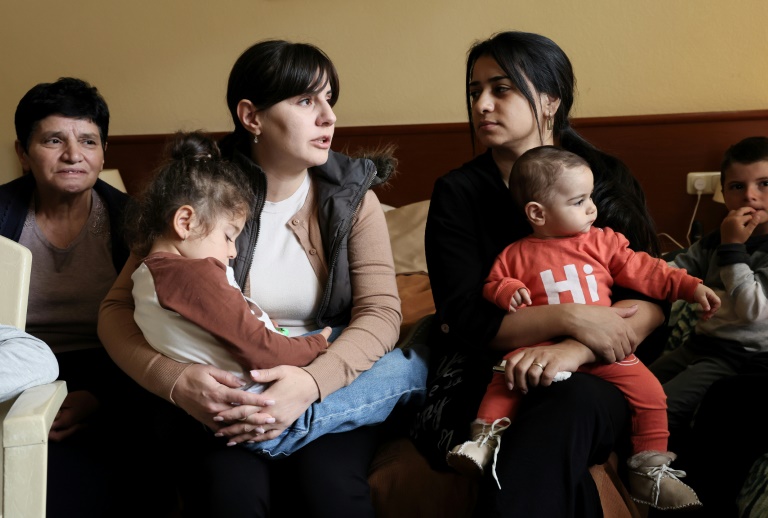Karabakh refugees transform Armenian mountain resort

The defeat of Karabakh separatists has caused the exodus of over 100,000 refugees to Armenia
Arzakan – In the autumnal beech forests of Aghveran in Armenia, the influx of refugees from Nagorno-Karabakh, who lived through a blockade and an Azerbaijani offensive, has changed the face of a mountain resort.
Siranush Kaitsakyan, manager of the Arthurs Aghveran Resort, a holiday home complex usually populated by holidaymakers from the capital, Yerevan, spoke emotionally of the refugees’ plight.
“A grandmother took 10 pieces of bread and nothing else. She said she had not eaten in such a long time,” she told AFP.
“They lost everything,” she said, holding back tears.
Aghveran, around 40 kilometres (25 miles) north of Yerevan, is a prestigious year-round resort where people come to ski in winter and find milder temperatures in summer.
The defeat of Karabakh separatists by Azerbaijani forces in a rapid offensive last month has caused the exodus of more than 100,000 refugees to Armenia.
The arrival of some of the refugees in Aghveran has transformed the clientele of the town’s numerous hotels and hostels.
The main nearby town of Arzakan is putting up 1,300 refugees, said local administration head Liparit Margaryan.
“We will host them as long as needed. It’s everyone’s responsibility to help these people,” Kaitsakyan said.
– ‘Left all my life behind’ –
Armine Tadevosyan came with her expanded family — 30 adults and children — from Stepanakert, capital of the self-proclaimed republic of Nagorno-Karabakh, which has announced its dissolution following surrender to Azerbaijan.
Tadevosyan was a grocer in Stepanakert and her husband Vilen was the owner of a window installation business.
Tadevosyan said she “left all my life behind” when they fled the enclave, as soon as Azerbaijan re-opened the road.
The hardest thing for them was not the panic of the flight from Karabakh or even the fear of the fighting around them.
Their most painful memories are of the suffering during a blockade when Azerbaijan restricted access through the Lachin Corridor — the only road link between Armenia and Nagorno-Karabakh.
The blockade started in December 2022 and led to frequent power cuts and long queues for buying essential goods.
Many used bicarbonate of soda as washing powder and even soap because of a scarcity of personal hygiene products.
In Goris, a border town where the family spent their first night in Armenia after 36 hours on the road, “we did not feel safe”, said the 33-year-old Tadevosyan.
The family continued their journey, finding out about accommodation being offered in Aghveran through social media.
They arrived in six cars without knowing if there would be any room left and were taken in by the tourist resort.
The children have started to smile again even if the memories of their “happy life” in Stepanakert leave them crying.
– ‘We have to work’ –
Conscious that they will probably never return to their homes, Tadevosyan and her family have to think about the future.
“Here we eat, sleep, the children play. We’re not doing much,” she said, while expressing gratitude for the assistance.
“We would be better off in Yerevan. We have to work. Our children need to go school,” she said.
But rents in the capital have skyrocketed because of an influx of young Russians fleeing possible mobilisation to Ukraine.
A three-room apartment costs around 350,000 drams ($860) a month, which is not affordable for the refugees.
The Armenian government has promised a one-off payment to each refugee of 100,000 drams and a monthly subsidy of 50,000 drams for at least six months.
As of last week, the Armenian government says it has provided temporary accommodation for 53,000 refugees.
Lower down in the valley, in the restaurant of another hotel complex, the local council has set up a registration point for refugees.
Officials use tablets to note requests.
“Do you need clothes? Do you have winter shoes and warm socks?” an employee could be heard asking one refugee.
Council leader Margaryan apologised for being unshaven.
“I have not slept for a week,” he said.
Children are enrolled with local schools and the sick are sent for treatment.
“But the priority is to give accommodation to everyone. The rest comes after,” he said.
